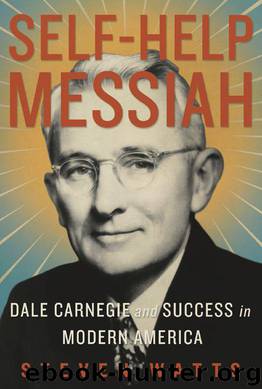Self-help Messiah: Dale Carnegie and Success in Modern America by Steven Watts

Author:Steven Watts [Watts, Steven]
Language: eng
Format: mobi
ISBN: 9781590515037
Publisher: Other Press
Published: 2013-10-28T14:00:00+00:00
From its first pages, How to Win Friends and Influence People bombarded readers with psychological principles, perspectives, and recommendations. Carnegie consistently employed psychologized language to convey his ideas and drew upon an impressive array of therapeutic experts to buttress his claims. “The famous Dr. Sigmund Freud of Vienna, one of the most distinguished psychologists of the twentieth century,” wrote Carnegie, “says that everything you and I do springs from two motives: the sex urge and the desire to be great.” He noted another famous psychologist’s stress on the human need to be valued: “William James said, ‘The deepest principle in human nature is the craving to be appreciated.’ ” Carnegie cited the famous American behaviorist John B. Watson and his declaration that “Sex is admittedly the most important subject in life. It is admittedly the thing which causes the most shipwrecks in the happiness of men and women.” But Carnegie exhibited a special fondness for Alfred Adler, the famous Viennese psychotherapist, and his book What Life Should Mean to You (1931). In that volume, wrote Carnegie, Adler declared, “It is the individual who is not interested in his fellow men who has the greatest difficulties in life and provides the greatest injury to others. It is from such individuals that all human failures spring.” Carnegie enjoined, “You can read scores of erudite tomes on psychology without coming across a statement more significant for you and me.”26
In a general way, psychology prompted Carnegie to consistently look for the hidden emotional, even unconscious, underpinnings of human actions. So he took a close look at human beings and their mental processes and discovered a welter of influences and impulses, many quite unpleasant, which directed their course in life. He concluded that people were “prejudiced and biased. Most of us are blighted with preconceived notions, with jealousy, suspicion, fear, envy, and pride.” He offered this dictum: “When dealing with people, let us remember that we are not dealing with creatures of logic. We are dealing with creatures of emotion, creatures bristling with prejudices and motivated by pride and vanity.”27
Download
This site does not store any files on its server. We only index and link to content provided by other sites. Please contact the content providers to delete copyright contents if any and email us, we'll remove relevant links or contents immediately.
Hit Refresh by Satya Nadella(9101)
When Breath Becomes Air by Paul Kalanithi(8406)
The Girl Without a Voice by Casey Watson(7864)
A Court of Wings and Ruin by Sarah J. Maas(7778)
Do No Harm Stories of Life, Death and Brain Surgery by Henry Marsh(6921)
Shoe Dog by Phil Knight(5238)
A Higher Loyalty: Truth, Lies, and Leadership by James Comey(4937)
The Rules Do Not Apply by Ariel Levy(4930)
Hunger by Roxane Gay(4908)
Tuesdays with Morrie by Mitch Albom(4750)
Everything Happens for a Reason by Kate Bowler(4717)
The Immortal Life of Henrietta Lacks by Rebecca Skloot(4564)
Millionaire: The Philanderer, Gambler, and Duelist Who Invented Modern Finance by Janet Gleeson(4441)
How to Change Your Mind by Michael Pollan(4334)
All Creatures Great and Small by James Herriot(4293)
The Money Culture by Michael Lewis(4166)
Man and His Symbols by Carl Gustav Jung(4113)
Elon Musk by Ashlee Vance(4105)
Tokyo Vice: An American Reporter on the Police Beat in Japan by Jake Adelstein(3965)
